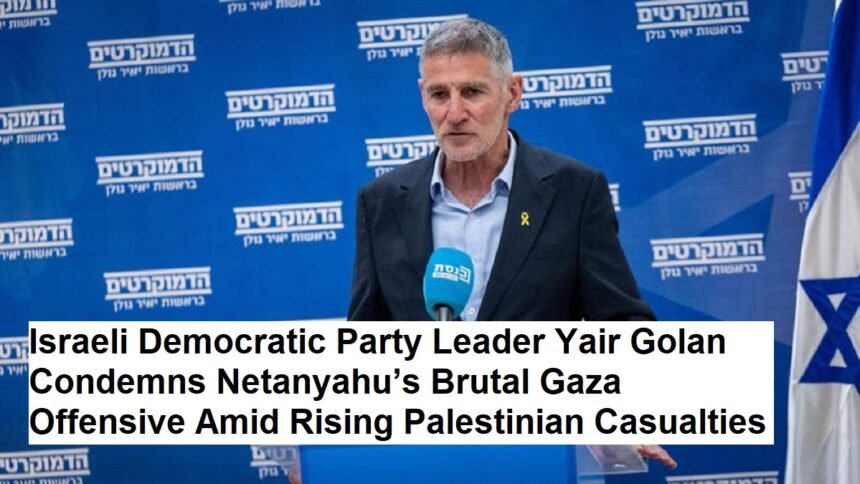On Tuesday, May 20, 2025, Yair Golan, the Chairman of Israel’s Democratic Party, delivered a scathing critique of Prime Minister Benjamin Netanyahu’s ongoing military campaign in the Gaza Strip. Speaking in a nationally broadcast interview on Kan Radio, Golan condemned the aggressive Israeli operations that have been ongoing since October 2023, calling for an immediate halt to what he described as a brutal and devastating offensive.
Background of the Conflict
The conflict between Israel and Palestinian factions in Gaza has escalated dramatically since October 2023. The Israeli government, under Netanyahu’s leadership, launched a large-scale military operation aimed at neutralizing militant groups in Gaza, primarily Hamas and other armed factions. This campaign has involved extensive airstrikes, ground incursions, and naval blockades, which Israel asserts are necessary to protect its citizens from rocket attacks and terrorism.
However, the offensive has resulted in catastrophic humanitarian consequences. According to reports, more than 53,000 Palestinians have lost their lives since the conflict began, a staggering figure that has drawn international condemnation and calls for ceasefire from various global actors. The civilian population in Gaza has borne the brunt of the violence, with widespread destruction of homes, infrastructure, and essential services such as healthcare and water supply.
Yair Golan’s Criticism
Yair Golan’s remarks represent a significant dissenting voice within Israeli politics, especially coming from a prominent opposition leader. He sharply criticized Netanyahu’s refusal to reconsider or scale back the military campaign despite the mounting death toll and humanitarian crisis. Golan described the ongoing aggression as “brutal” and “unsustainable,” emphasizing the urgent need for Israel to stop the offensive to prevent further loss of innocent lives.
In his interview, Golan stressed that the continuation of such a harsh military approach risks deepening the cycle of violence and undermining Israel’s moral standing both domestically and internationally. He urged the government to explore diplomatic avenues and engage in dialogue to seek a peaceful resolution to the conflict, rather than relying solely on military force.
Political and Social Implications
Golan’s outspoken criticism highlights growing divisions within Israeli society and politics regarding the Gaza conflict. While Netanyahu’s government maintains strong support among certain segments of the population who prioritize security and a hardline stance against militant groups, there is increasing concern among others about the humanitarian impact and long-term consequences of the war.
The Democratic Party, under Golan’s leadership, is positioning itself as a voice for moderation and peace, advocating for policies that balance Israel’s security needs with respect for human rights and international law. Golan’s call to end the aggression reflects a broader debate within Israel about the country’s future direction and its role in the region.
International Reactions and Humanitarian Concerns
The international community has closely monitored the Gaza conflict, with many countries and organizations expressing alarm over the high civilian casualties and destruction. The United Nations, humanitarian groups, and several governments have repeatedly called for ceasefires and negotiated settlements to alleviate the suffering of the Palestinian people.
Golan’s statements resonate with these global concerns, reinforcing the message that military solutions alone cannot resolve the deep-rooted issues fueling the conflict. His appeal for an immediate cessation of hostilities aligns with international efforts to promote peace and stability in the region.
Conclusion
In summary, Yair Golan’s condemnation of Prime Minister Benjamin Netanyahu’s Gaza policy marks a critical moment in Israeli political discourse. His call to end the brutal military offensive, which has resulted in over 53,000 Palestinian deaths since October 2023, underscores the urgent need for a shift towards diplomacy and humanitarian consideration. As the conflict continues to unfold, voices like Golan’s may influence public opinion and policy decisions, potentially opening pathways to peace in one of the world’s most protracted and complex conflicts.









